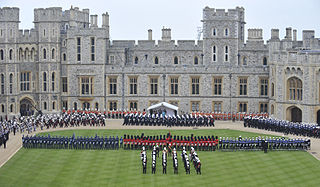 W
WThe 2019–2020 Persian Gulf crisis is an intensification of military tensions between the Islamic Republic of Iran and their allies and the United States of America and their allies in the Persian Gulf region. The U.S. began a buildup of its military presence in the region to deter an alleged planned campaign by Iran and its non-state allies to attack American forces and interests in the Persian Gulf and Iraq. This followed a rise in political tensions between the two countries during the Trump administration, which included the withdrawal of the U.S. from the Joint Comprehensive Plan of Action (JCPOA), the imposition of new sanctions against Iran, and the designation of the Islamic Revolutionary Guard Corps (IRGC) as a terrorist organization. In response, Iran designated the United States Central Command as a terrorist organization.
 W
WThe United Kingdom was one of the first countries to take part in Operation Enduring Freedom against the Taliban regime in autumn 2001.
 W
WThe United Kingdom began a military intervention in Sierra Leone on 7 May 2000 under the codename Operation Palliser. Although small numbers of British personnel had been deployed previously, Palliser was the first large-scale intervention by British forces in the Sierra Leone Civil War. In early May 2000, the Revolutionary United Front (RUF)—one of the main parties to the civil war—advanced on the country's capital, Freetown, prompting the British government to dispatch an "operational reconnaissance and liaison team" (ORLT) to prepare to evacuate foreign citizens. On 6 May, the RUF blocked the road connecting Freetown to the country's main airport, Lungi. The next day, British soldiers began to secure the airport and other areas essential to an evacuation. The majority of those who wished to leave were evacuated within the first two days of the operation, but many chose to stay following the arrival of British forces.
 W
WThe Combined Joint Expeditionary Force (CJEF) is an Anglo-French military force. It draws upon both the British Armed Forces and the French Armed Forces to field a deployable force with land, air and maritime components together with command and control and supporting logistics. It is distinct from the similarly named UK Joint Expeditionary Force.
 W
WThe Lancaster House Treaties of 2010 are two treaties between the United Kingdom and France for defence and security cooperation. They were signed at 10 Downing Street on 2 November 2010 by British prime minister David Cameron and French President Nicolas Sarkozy.
 W
WThe Defence Reform Act 2014 is an Act of the Parliament of the United Kingdom. It has 51 sections and seven schedules, and is concerned with defence procurement and the UK Reserve Forces, particularly the Territorial Army.
 W
WThe Diamond Jubilee Armed Forces Parade and Muster was a military parade held at Windsor Castle and Home Park in Windsor, Berkshire, England, organised as part of the Queen Elizabeth II's Diamond Jubilee celebrations. Performed as a tribute to the Queen on behalf of all three branches of the British Armed Forces, it featured a review of members of all three services by the monarch, a military parade through the town, and flypasts by current and historic military aircraft.
 W
WOn 23 March 2007, fifteen Royal Navy personnel from HMS Cornwall were searching a merchant vessel when they were surrounded by the Navy of the Iranian Revolutionary Guards and detained off the Iran–Iraq coast. In the course of events, British forces claimed that the vessel was in Iraqi waters, but the Iranians insisted that they were in Iran's territorial waters. The fifteen personnel were released thirteen days later on 4 April 2007.
 W
WThe Proliferation Security Initiative (PSI) is a global effort that aims to stop trafficking of weapons of mass destruction (WMD), their delivery systems, and related materials to and from states and non-state actors of proliferation concern. Launched by United States President George W. Bush in May 2003 at a meeting in Kraków, Poland, the PSI has now grown to include the endorsement of 105 nations around the world, including Russia, Canada, the United Kingdom, Australia, France, Germany, Italy, Argentina, Japan, the Netherlands, Poland, Singapore, New Zealand, Republic of Korea and Norway. Despite the support of over half of the Members of the United Nations, a number of countries have expressed opposition to the initiative, including India, China and Indonesia.